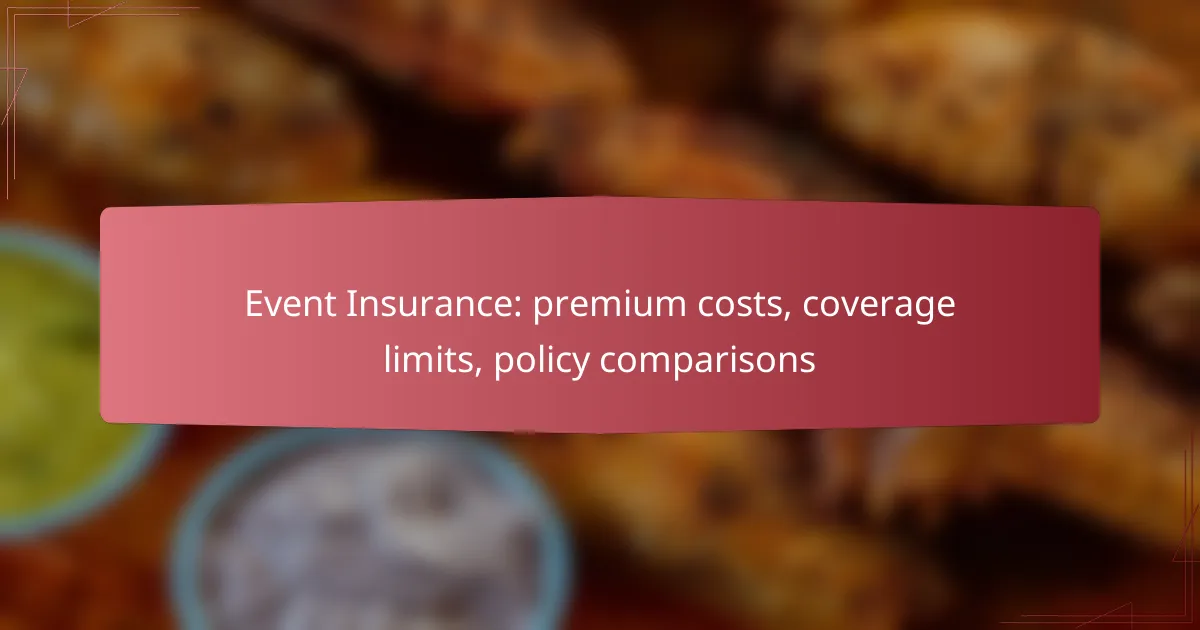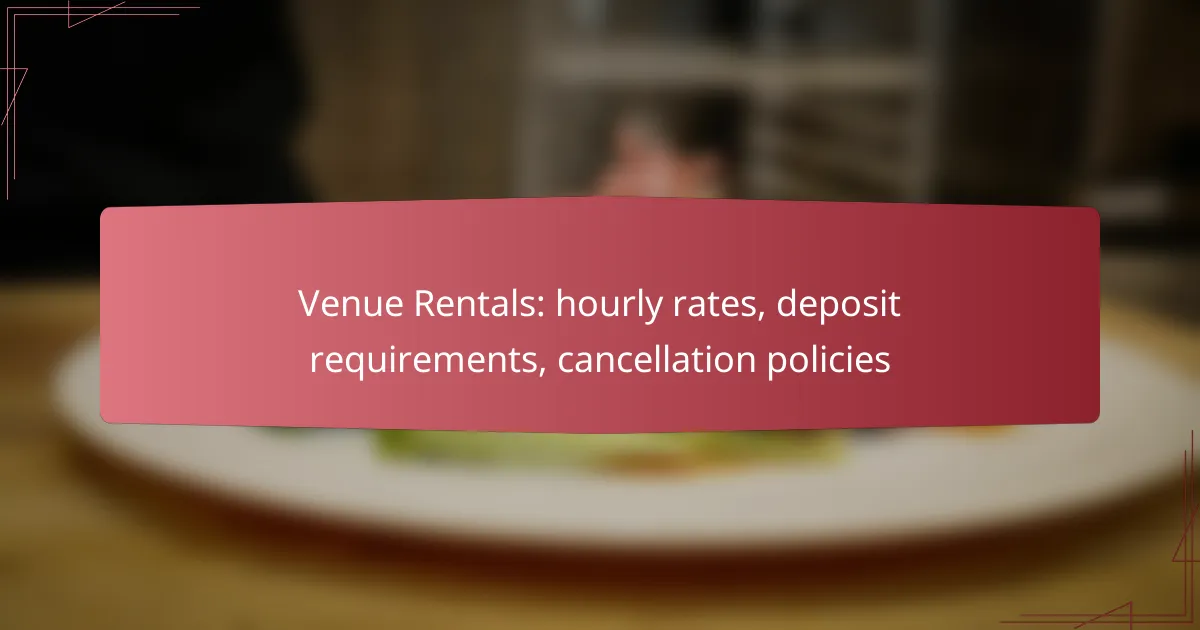Event insurance is essential for protecting against unforeseen incidents that could disrupt your gathering, with premium costs varying based on event type, coverage limits, and insurer. Typically, premiums can range from modest amounts for small events to several hundred pounds for larger, higher-risk occasions. Understanding the coverage limits and exclusions is crucial for selecting a policy that aligns with your specific needs and budget.
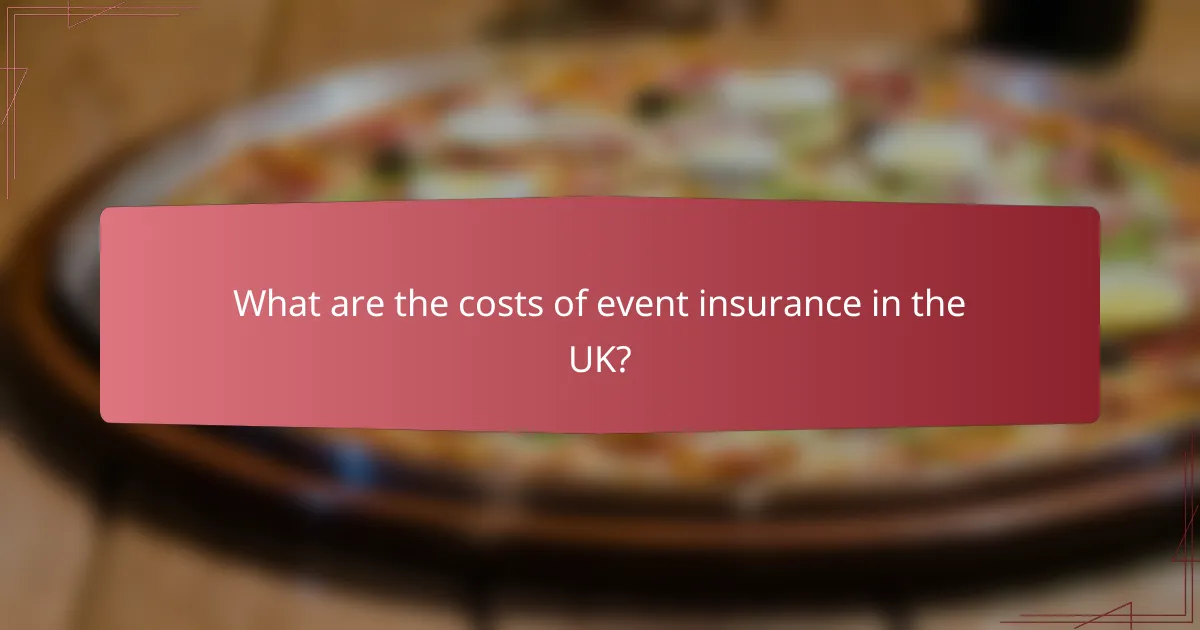
What are the costs of event insurance in the UK?
The costs of event insurance in the UK can vary significantly based on several factors, including the type of event, coverage limits, and the insurer. Generally, premiums can range from low tens of pounds for small gatherings to several hundred pounds for larger events with higher risks.
Average premium costs
On average, event insurance premiums in the UK typically range from £50 to £300. Smaller events, such as birthday parties or local community gatherings, may cost around £50 to £100, while larger events like weddings or corporate functions can see premiums between £150 and £300. The specific cost will depend on the event’s nature and the coverage required.
Factors affecting pricing
Several factors influence the pricing of event insurance, including the event type, duration, location, and the number of attendees. High-risk events, such as festivals or sporting events, usually attract higher premiums due to increased liability exposure. Additionally, the level of coverage chosen, such as public liability or cancellation insurance, will also impact the overall cost.
Insurers may also consider the event’s history and the organizer’s claims record. A history of previous claims can lead to higher premiums, while a clean record may result in lower costs.
Regional pricing variations
Event insurance costs can vary by region within the UK. For example, events held in major cities like London may have higher premiums compared to those in rural areas due to increased risks and costs associated with urban settings. Additionally, local regulations and market competition can influence pricing, leading to variations across different regions.
It’s advisable for event organizers to compare quotes from multiple insurers and consider local factors that may affect their specific event insurance costs. This can help in finding the best coverage at a competitive price.
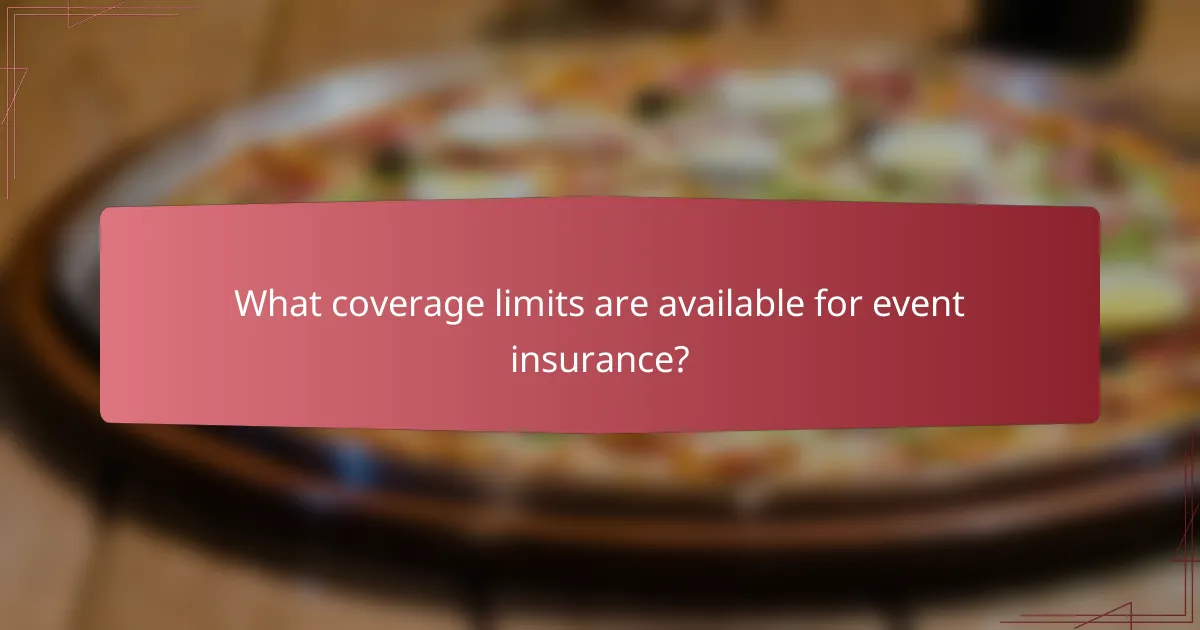
What coverage limits are available for event insurance?
Event insurance typically offers a range of coverage limits that can be tailored to the specific needs of the event. These limits determine the maximum amount the insurer will pay for claims related to cancellations, liability, and other covered incidents.
Standard coverage limits
Standard coverage limits for event insurance often start around $1 million for general liability and can go up to $5 million or more, depending on the insurer and the type of event. For cancellation coverage, limits may range from $10,000 to $500,000, depending on the event’s size and budget.
When selecting coverage limits, consider the potential financial risks associated with your event. Higher limits typically result in higher premiums, so it’s essential to balance adequate protection with your budget.
Maximum coverage options
Maximum coverage options can vary significantly among insurers, with some offering limits exceeding $10 million for large-scale events. For instance, major festivals or conferences may require higher liability limits due to the increased risk of accidents or cancellations.
It’s advisable to consult with your insurance provider to explore maximum coverage options that align with your event’s scale and potential liabilities. This ensures you have sufficient protection against unforeseen circumstances.
Specific exclusions and limitations
Event insurance policies often contain specific exclusions and limitations that can affect coverage. Common exclusions include damages resulting from alcohol-related incidents, acts of terrorism, or natural disasters unless specifically included in the policy.
Reviewing the policy details is crucial to understand what is not covered. Some insurers may offer endorsements to expand coverage, but these may come with additional costs. Always clarify these points with your insurer before finalizing your policy.

How do I compare event insurance policies?
To compare event insurance policies effectively, focus on key factors such as coverage limits, premiums, and exclusions. Evaluating these elements will help you identify the best policy that meets your specific needs and budget.
Key comparison criteria
When comparing event insurance policies, consider coverage limits, which indicate the maximum amount the insurer will pay for a claim. Look for policies that cover essential aspects like cancellation, liability, and property damage. Additionally, assess the premiums, which can vary significantly based on the event type and coverage level.
Exclusions are another critical factor; some policies may not cover specific risks, such as extreme weather or vendor issues. Read the fine print to understand what is and isn’t covered, as this can greatly affect your financial protection.
Top providers in the UK
Several reputable providers offer event insurance in the UK, including Event Insurance Services, Cover4Events, and Insure4Music. Each of these companies provides various policies tailored to different event types, such as weddings, festivals, and corporate gatherings.
It’s advisable to read customer reviews and check ratings to gauge the reliability of these providers. Comparing quotes from multiple insurers can help you find competitive rates and suitable coverage options for your event.
Sample policy comparisons
| Provider | Coverage Limit | Premium Range | Key Features |
|---|---|---|---|
| Event Insurance Services | Up to £5 million | £50 – £200 | Cancellation, liability, and equipment cover |
| Cover4Events | Up to £10 million | £40 – £180 | Flexible policies for various events |
| Insure4Music | Up to £2 million | £30 – £150 | Specialized for music events and festivals |
These sample comparisons illustrate the differences in coverage limits and premiums among top providers. When selecting a policy, ensure that the features align with your event’s specific needs to avoid gaps in coverage.
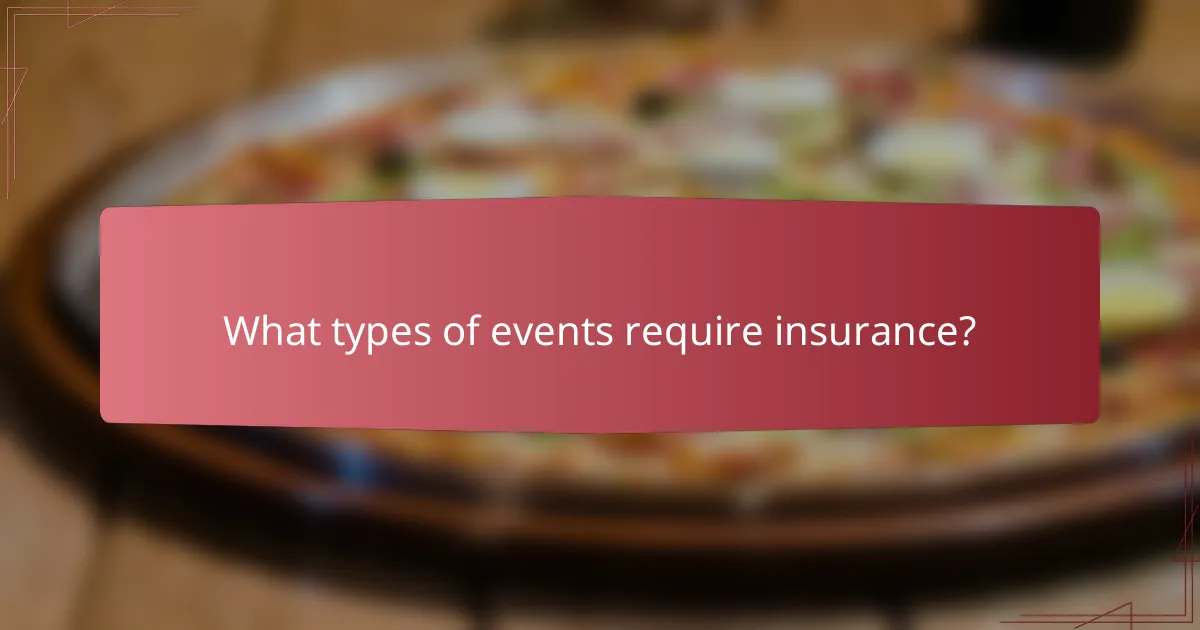
What types of events require insurance?
Various events necessitate insurance to protect against potential liabilities and financial losses. Common types include weddings, corporate gatherings, and public festivals, each with unique risks and coverage needs.
Weddings and receptions
Weddings and receptions often involve significant financial investments, making insurance essential. Coverage typically includes liability for injuries, property damage, and even cancellation due to unforeseen circumstances.
When selecting a policy, consider factors such as the venue size, guest count, and specific vendor contracts. Coverage costs can range from a few hundred to several thousand dollars, depending on the event’s scale and location.
Corporate events
Corporate events, including conferences and team-building activities, require insurance to safeguard against potential liabilities. This can cover accidents, property damage, and even cancellation due to emergencies.
It’s crucial to assess the venue, number of attendees, and activities planned when choosing coverage. Policies may start at several hundred dollars and can increase significantly based on the event’s complexity and risk factors.
Public gatherings and festivals
Public gatherings and festivals often attract large crowds, making them susceptible to various risks. Insurance for these events typically includes general liability, event cancellation, and sometimes weather-related coverage.
Event organizers should evaluate expected attendance, activities, and local regulations when determining insurance needs. Costs can vary widely, often ranging from low thousands to tens of thousands of dollars, depending on the event’s size and scope.

What are the prerequisites for obtaining event insurance?
To obtain event insurance, you need to provide specific documentation and details about the event, as well as meet the requirements set by the insurance provider. Understanding these prerequisites can streamline the application process and ensure you secure the appropriate coverage.
Required documentation
When applying for event insurance, you typically need to submit documentation such as proof of the event venue, a detailed event plan, and any contracts with vendors. Some insurers may also require a copy of the event’s permits or licenses, depending on the nature of the event.
It’s advisable to gather these documents in advance to avoid delays in the underwriting process. Having everything organized can help you present a strong case for your coverage needs.
Event details needed
Insurance providers will ask for comprehensive details about the event, including the date, location, expected attendance, and type of activities planned. This information helps them assess the risk involved and determine the appropriate coverage limits.
For instance, a wedding may require different coverage compared to a large festival or corporate event. Be prepared to provide specifics about any high-risk activities, such as fireworks or live performances, as these can influence your premium.
Insurance provider requirements
Each insurance provider may have unique requirements, but common criteria include the event’s scale, the coverage amount requested, and the applicant’s claims history. Some insurers may also evaluate the financial stability of the event organizer.
To improve your chances of approval, consider working with a broker who specializes in event insurance. They can help you navigate different policies and find a provider that aligns with your specific needs and event type.
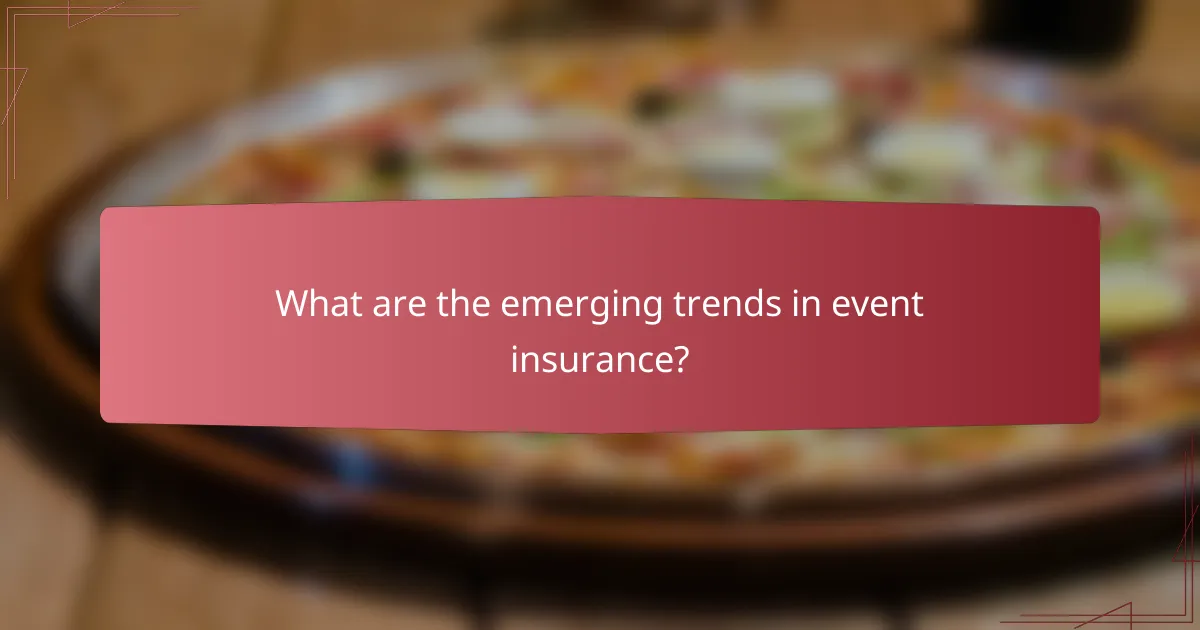
What are the emerging trends in event insurance?
Emerging trends in event insurance reflect the evolving landscape of risks associated with gatherings. Insurers are increasingly focusing on coverage for pandemics, climate-related disruptions, and digital events, adapting policies to meet the needs of event organizers.
Increased demand for coverage against pandemics
The COVID-19 pandemic has significantly heightened awareness of the need for pandemic-related coverage in event insurance. Organizers are now seeking policies that protect against cancellations or disruptions caused by health crises. This trend is likely to persist as more events incorporate health and safety measures into their planning.
Climate change considerations
As extreme weather events become more common, event insurance is evolving to address climate-related risks. Policies are increasingly including coverage for cancellations due to severe weather conditions, such as hurricanes or floods. Event planners should assess the location and season of their events to ensure adequate protection against these risks.
Digital and hybrid event coverage
The rise of virtual and hybrid events has led insurers to develop specialized policies that cover both in-person and online components. This includes protection against technical failures, cyber threats, and other digital risks. Event organizers should consider these factors when selecting insurance to ensure comprehensive coverage.
